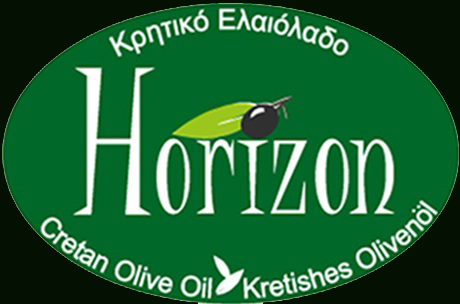Olive oil is the main ingredient of the Mediterranean diet. Its beneficial effect on both health and longevity has been documented in the rich volume of literature surrounding this product. Olive oil contains acids such as oleic, linoleic, palmitico and steric as well as phytosterels. It has a higher proportion of monounsaturated fatty acids (72-77%), than saturated acids (10-12%) and polyunsaturated acids (17%), and it is also a rich source liposoluble vitamins A,D,K and E which are specifically beneficial for human health. Organic Olive Oil like “HORIZON” which is completely free of chemical pesticides and agrochemicals, ensures that these beneficial properties of olive oil are fully present. Specific impact of olive oil on health
1. Olive oil fortifies the heart and blood vessels.
Mortality from coronary heart disease in relation to diet is much lower in populations with a Mediterranean –style diet based on olive oil. Moderate daily consumption of olive oil reduces the risk of coronary heart diseases by 47%, while people consuming 55g of olive oil per day were 82% less likely to have a heart attack. Consumption of olive oil improves the function of blood vessels and regulates blood pressure, causing a significant decrease in both systolic and diastolic pressure and reduces the need to take medication for hypertension by 50% in hypertensive individuals. Olive oil also helps prevent the development of clots and exerts a protective measure against stroke. Numerous medical reports on the beneficial effects of the consumption of olive oil have been ratified by the Greek Society of Cardiology. Scientific studies show that the consumption of olive oil is a beneficial factor in the prevention and development of various cancers. Olive oil appears to help in the prevention of breast cancer. Extra virgin olive oil inhibits the gene of breast cancer according to findings of the Institute of Oncology of California. The consumption of olive oil also appears to protect against the onset of colon cancer, ovarian cancer and cancers of the esophagus, lung and pancreas.
3. Other beneficial effects of olive oil on health.
a) Olive oil and diabetes Diabetes is a chronic metabolic disorder, due to either inadequate levels of insulin (diabetes type 1) or insulin resistance (diabetes type 2). Diet is the basis of treatment of diabetes, especially type 2 diabetes. The two main objectives are: (1) Weight loss and treatment of obesity, and (2) Choosing a diet, the composition of which will help to control blood sugar and lipoprotein concentrations. The recommended diet is low in saturated fat, and high in either carbohydrates or monounsaturated fatty acids. The traditional Mediterranean diet meets all the requirement of these two dietary choices, and offers a wide variety of grains, fruits, vegetables and legumes, and also allows for alterations in the relative amount of olive oil consumed daily. Thanks to the wide variety of the Mediterranean diet and the tastiness and palatability of its components, patients can easily follow this dietary treatment.
b) Virgin olive oil protects the liver.
Initial research on animals has shown that the consumption of olive oil reduces damage in liver cells. This is attributed to the antioxidants found in olive oil.
c) Olive oil and bone density.
Dietary habits characterized by high intake of olive oil and fish oil help women maintain their bone mass as they age.
d) Olive oil protects against ulcerative colitis.
Increasing the intake of olive oil can help protect against ulcerative colitis. People who have adopted a diet rich in oleic acid are less likely to develop ulcerative colitis.
e) Other benefits.
Recent studies support the view that using olive oil helps in the functioning of memory and other cognitive functions, contributing generally to better mental health. Finally, synthesized molecules found in olive oil appear to be useful in the treatment of Parkinsons Disease.
Hart Andrew East Anglia’s School of Medicine, New Orleans, 2010
American Diabetes Association: Nutrition recommendations and principles for people with diabetes mellitus. Diabetes Care 23:543-546 (2000) Perez Jimenez Francisco Reina Sofia, Cordoba, 2007 American Journal of Clinical Nutrition Samieri Cecilia National Institute of Health and Medical Research, Bordeaux Source: “Neurology”, 2011 Nigkam Anil Heart Institute of the University of Montreal. Canadian Journal of Cardiology, 2012 Hammami Mohamed University of Monastir, Tunisia Nutrition and Metabolism, 2010 Kontogianni et al. Association between dietary patterns and indices of bone mass in a sample of Mediterranean women. Nutrition, 25:165-171, 2009 Menendez Javier Catalan Institute of Oncology “BMC Cancer”, Jan. 2009 Michael Stoneham University of Oxford Journal of Epidemiology and Community Health 2000; 54:756-760 Food and Agricultural Organisation. Food balance sheets. Rome, Italy: 1996 Kushi LH, Lenart EB, Willet WC. Health implications of Mediterranean diets in light of contemporary knowledge. Meat, wine, fats and oils. Am J Clin Nutr 1995; 61: 1416-27S Serra Majem L, La Vecchia C, Ribas Barba L, et al. Changes in diet and mortality from selected cancers in southern Mediterranean countries, 1960-1989. Eur J Clin Nutr 1993; 47:S25-34 Weisburger JH. Dietary fat and risk of chronic disease: mechanistic insights from experimental results. J Am Diet Assoc 1997; 97:S16-23 Benito E, Obrador A, Stiggelbout A, et al. A population based case-contrl study of colorectal cancer in Majorca. I. Dietary factors. Int J Cancer 1990; 45:69-76 McMichael AJ, McCall MG, Hartshorne JM, et al. Patterns of gastro-intestinal cancer in European migrants to Australia: role of dietary change. Int J Cancer 1980; 25:431-7 Journal of Epidemiology and Community Health, 2000 Oct;54(10):756-760 Kremastinos Dimitris Professor of Cardiology University of Athens President: Greek Cardiologic Association Paravantes Elena, Tupper Naomi Keys Ancel (1980). Seven Countries: A Multivariate analysis of Death and Coronary Heart Disease. Harvard University Press. ISBN 0674802373. Kontogianni MD Panagiotakis DB, Chrysohoou C.Pitsavos C, Zampelas A, Stefanadis. The impact of olive oil consumption pattern on the risk of acute coronary syndromes: THE CARDIO2000 case-control study. Clin Cardiol 2007 Mar;30(3):125-9. Fernandez-Jarne E, Martinez-Losa E, Prado-Santamaria M, Brugarolas-Brufau C, Serrano-Martinez M, Martinez-Gonzalez MA. Risk of first non-fatal myocardial infarction negatively associated with olive oil consumption: a case-control study in Spain. Int J Epidemiol. 2002 Apr;31 (2):474-80. | 








